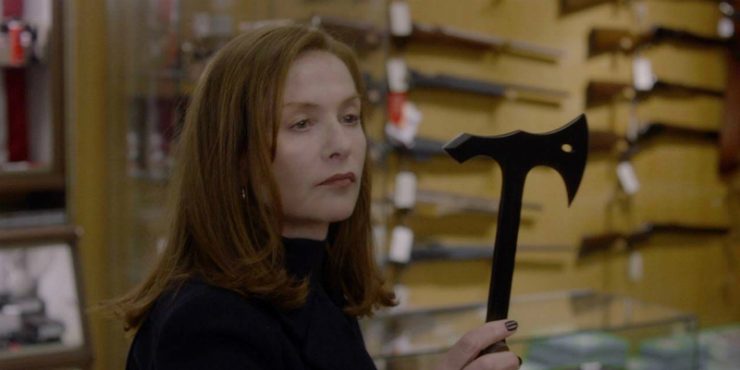I’ve never quite grasped the films of Paul Verhorven. The sheer magnitude of his capacity for provocation has always seemed somewhat beyond me. I can’t manage to see much beyond the extreme images he’s putting in front of us, and I often find myself wondering how much more there possibly could be. Elle was more of the same for me; a complicated, challenging film with strong performances that seemed to have a little too much fun dancing along the edge of morality. The film stars the great Isabelle Huppert, one of the greatest actors on the planet, in the kind of role she has dominated for decades. She is so completely unafraid of the dangers of sexuality, which allows her to excel in films like Michael Haneke’s The Piano Teacher and ultimately in Verhoeven’s latest film. Both films have a unique interest in the dynamics of perversity, and how it reflects the torment of our lives. While Haneke’s movie was imbued with empathy, Elle is strapped with a cynical, diobolical streak. Verhoeven doesn’t seem to have any regard at all for the political correctness that might come with making a film about sexual assault, and to Huppert’s credit, she follows him there. I’m just not sure I can think of a worse time for a movie like this to be released.
Huppert is, in a lot of ways, a genius, and Elle is a continuation of that. She plays Michèle, a successful producer at a large video game company. She runs the company with her best friend, Anna (Anne Consigny), while sleeping with Anna’s husband, Robert (Christian Berkel). Her son, Vincent (Jonas Bloquet) is dating a narcisistic, hot-tempered woman named Josie (Alice Isaaz), while her ex-husband Richard (Charles Berling) is dating a much younger yoga instructor named Hélène (Vimala Pons). Her mother, Irène (Judith Magre), has tired of life alone in her late age and has fully employed a gigolo named Ralf (Raphaël Lenglet) to be her companion. Michèle has gotten use to those around her being needy, self-involved, even cruel. After an unorthodox childhood involving a father in prison for a grisly crime, Michèle has evolved with the kind of stiff upper lip that has allowed her to rebuild herself. Overcoming the notorious behavior of her father was the real challenge, the plights of her friends and family seem like small potatoes; but when Michèle is raped one morning on the floor of her own living room by a strange masked man, the basis of her strength begins to go to pieces, and a scary reality becomes apparent.
Tensions abound throughout Michèle’s life. The lead game designer at her company, Kurt (Lucas Prisor), bristles at Michèle’s terse, capitalistic direction. She battles constantly with her mother’s recent life decisions, and Vincent’s choice to stay with the pregnant Josie even though his fatherhood is under question does little for her peace of mind. There’s an aspect of courtship for Michèle. She seeks out the chaos in others, enjoys overcoming the disruptions. She makes friends with her younger neighbors, a devout couple Rebecca (Virginie Efira) and Patrick (Laurent Lefitte), but almost chuckles at their perfection. She almost cannot fathom their picturesque existence, is skeptical of it. Verhoeven is incredibly skeptical as well. The film’s screenplay, written by David Birke, has a sadistic edge to it, a distaste for the traditional aspects of human relationships. Elle plays with humanity’s tendency toward violence, sexual violence in particular, but does so in a way that seems to almost shrug off consequence or consideration for others. Perhaps the film is caught between Birke’s more conceptually fantastical fatalism and Verhoeven’s cynicism toward basic decency. The legendary Dutch director isn’t just trying to take out the patriarchy here, he’s going for everyone.
Huppert is brilliant here. Michèle is a character so few actresses could play, especially considering the way Verhoeven wants it played. She’s so careful with Michèle, a woman of both stunning strength and startling weakness. Even if Verhoeven isn’t, Huppert refuses to abandon the humanity present in this story. Earlier this year, Huppert appeared in Jochim Trier’s Louder Than Bombs, as a mother and wife whose death has deeply affected the family left behind. Trier flashes back enough times for Huppert to create a fully crafted character, and the film works so well because it has three performances (from Gabriel Byrne, Jesse Eisenberg and Devin Druid) that all revolve around the work that Huppert produces. Louder Than Bombs is one of my favorite films of the year. Elle, unfortunately, is not. The timing isn’t great for a number of reasons, and I don’t want to spoil anything, but Trump America is probably not the space in which a movie like Elle can thrive. It certainly didn’t with me.
Directed by Paul Verhoeven










